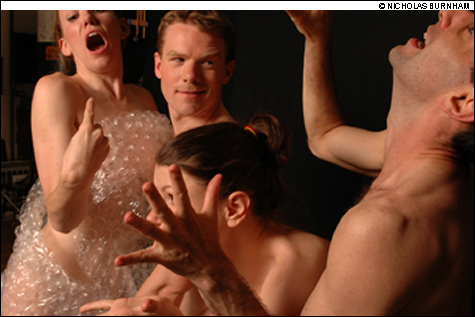
dance happen. |
David Parker was born too late for vaudeville, but he’s been making up for lost time. Best known for Nut/Cracked, the naughty-and-nice holiday reworking of The Nutcracker that he will be bringing back to Boston under the auspices of the Theatre Offensive next November, David Parker & the Bang Group have as their calling card the shtick that pops up just this side of slapstick. The good news is that the laughs come at no one’s expense — except, perhaps, that of outmoded sissy stereotypes.
Take Critical Mass, which Parker and Sara Hook choreographed in 1999. In his red football jersey, Parker could be a hefty guy ready to knock back a couple of beers in front of the tube. Then he starts singing “Là ci darem la mano,” from Mozart’s Don Giovanni, and hangs onto the curtains for support as his balletic efforts thud and his duet with Jeffrey Kazin goes disco. He inserts jokes into a fluent choreographic line that sets up certain expectations. Then he turns around and gives his audience a cream pie in the kisser.
The more recent Show Business reads as a footnote to Critical Mass, as a brave-seeming Emily Tschiffeley in poufy blue tulle flops on her behind to a strange, a cappella version of Ethel Merman singing “There’s No Business like Show Business.” It’s a theme all right: loving all the strutting and fretting upon the stage, but feeling a bit bruised by it all.
That theme ran through all of Saturday night’s performance as David Parker & the Bang Group made their 11th consecutive appearance at Concord Academy under the auspices of Summer Stages Dance. For this visit, Parker cut his hour-long Hour upon the Stage (which premiered in New York City this past spring) down to an 18-minute quartet. From the opening, where Kazin in an orange muscle shirt jogs around the perimeter of the space, to an escape from a syrupy “Moon River” ballet, Hour upon the Stage seems preoccupied with the sheer physical effort it takes to make dance happen. Kazin held his thigh as if it were a heavy weight he had to lower to the floor. Amber Sloan pushed his puffed-out chest to deflate it like a plastic bag full of air. Nic Petry sprinting backward, almost wiped out.
For most of Hour upon the Stage, the sounds of the dancers’ labored breathing and bare feet slapping against the floor were the only audible accompaniment. It wasn’t clear whether Parker had chosen silence to put the focus entirely on the dancing or whether he just needed to excise whatever music he had been using when he cobbled together the suite from a longer work.
You Too, the dance Parker made with Hook for her students and colleagues at the University of Illinois at Urbana-Champaign, was set to Chopin’s pianistic Variations on “Là ci darem la mano.” Parker says that using the same aria twice was a coincidence, but given that Hook contributed to both works, I kind of doubt it. Bookending a single performance, this musical reprise gave the program a welcome through-line but also spotlighted a more unwelcome sense of déjà vu. Were the dancers engaged in synchronized sneezes and sniffs? It’s not something you hear in a dance concert every day, of course, but I remember sneezing in Parker’s version of “The Waltz of the Flowers.” Were they beating counterpoint with their feet against the Chopin arpeggios? Well, yes, but the simple rhythm was pretty much the same one that Parker had used in every one of the program’s other dances, as if there were a song he was singing obsessively under his breath. After close to two hours upon the stage, You Too looked way too much like “Here We Go Again.”